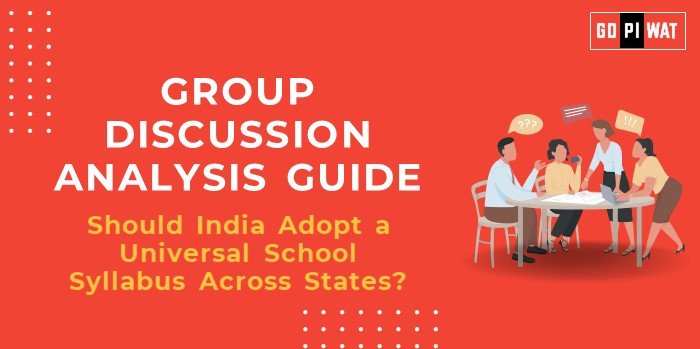📋 Should India Adopt a Universal School Syllabus Across States?
🌐 Introduction to Universal School Syllabus
Opening Context: Education systems worldwide aim for inclusivity and consistency to ensure all children have equal opportunities. A universal school syllabus across Indian states could streamline education, bridging diverse regional disparities.
Topic Background: India’s current educational framework allows each state to customize its syllabus, leading to significant variations. While this approach caters to regional needs, the lack of uniformity can impact educational equity and student mobility. The National Education Policy (NEP) 2020 has sparked discussions on more standardized educational frameworks, although challenges remain.
📊 Quick Facts and Key Statistics
- 🏫 Number of Schools in India: Over 1.5 million schools serve students across various boards, including CBSE, ICSE, and state boards.
- 📉 Literacy Rate Disparities: Literacy rates vary, with Kerala at 96.2% and Bihar at 61.8%, indicating regional educational imbalances.
- 🚶 Student Migration: Approximately 1.7 million students migrate between states each year, often facing challenges in curriculum adaptation.
- 📜 NEP 2020’s Goal: Aims for uniform educational quality, advocating skill-based learning and curriculum reforms for consistency.
👥 Stakeholders and Their Roles
- 🏛️ Central Government: Develops national policies and frameworks (like NEP 2020), promoting standardization.
- 🌏 State Governments: Currently responsible for setting syllabi, reflecting regional languages, culture, and history.
- 📘 Educational Boards: Define curriculum standards, exams, and syllabus content, impacting student outcomes.
- 👨👩👧👦 Students and Parents: Core beneficiaries of a standardized syllabus for equitable educational access and ease of mobility.
🏆 Achievements and Challenges
✨ Achievements
- 📈 Improved Literacy and Enrollment: Standardizing core subjects could further India’s literacy goals, building on increased school enrollment and literacy gains from policies like RTE.
- 🎓 Educational Mobility: A common syllabus can ease student transitions across states and facilitate national exams like JEE and NEET.
- 📚 Centralized Resource Development: Shared resources reduce costs and improve access to quality materials.
⚠️ Challenges
- 🌍 Regional Relevance: A one-size-fits-all approach might disregard regional languages, cultures, and unique histories.
- 💸 Implementation Costs: Establishing a universal syllabus requires substantial investment in training and materials.
- 🤝 Resistance from States: Education is a state subject, and states may resist centralization of curriculum.
Global Comparisons: The United States allows individual states control over curriculum while following general frameworks. Germany employs a coordinated system where regions adapt shared standards, balancing standardization and local identity.
Case Study: Tamil Nadu’s curriculum reforms demonstrate the potential of a hybrid approach, aligning with NEP while retaining regional content.
💡 Structured Arguments for Discussion
- ✔️ Supporting Stance: “A universal syllabus will promote equality in educational access and learning standards, helping bridge the urban-rural and inter-state educational divides.”
- ❌ Opposing Stance: “A universal syllabus could erode regional diversity, limiting students’ understanding of local history, languages, and culture.”
- ⚖️ Balanced Perspective: “While a universal syllabus could strengthen national unity in education, a hybrid model that allows regional modifications would better preserve local identity.”
🔑 Effective Discussion Approaches
- 📊 Opening Approaches:
- Data-Driven Start: “With over 1.7 million students migrating across states each year, a unified syllabus could simplify their academic transitions.”
- Comparative Opening: “Countries like Germany use standardized frameworks that allow for regional adaptation—India could explore a similar approach.”
- Policy-Based Introduction: “The NEP 2020 already emphasizes standardized quality; adopting a universal syllabus could be the next logical step.”
- 🛠️ Counter-Argument Handling: Use data on student migration to support the argument for standardization. Acknowledge regional diversity and suggest a syllabus framework that incorporates essential national standards with regional content flexibility.
📈 Strategic Analysis of Strengths and Weaknesses
- 💪 Strengths: National cohesion, streamlined assessments, increased educational quality consistency.
- 💔 Weaknesses: Potential loss of regional context, logistical costs, possible state resistance.
- 🌟 Opportunities: Greater student mobility, national identity, and equal opportunities for competitive exams.
- ⚡ Threats: Risk of centralization reducing adaptability, regional dissatisfaction, potential mismatch with local needs.
📚 Connecting with B-School Applications
- 💼 Real-World Applications: Potential B-school project themes in educational policy, implementation logistics, and change management.
- ❓ Sample Interview Questions:
- “How can a universal syllabus impact India’s educational quality?”
- “Discuss the challenges of implementing a common syllabus in a diverse country like India.”
- 🎓 Insights for B-School Students: Consider implications for nationwide policy making, logistics, and balancing centralization with regional autonomy.


